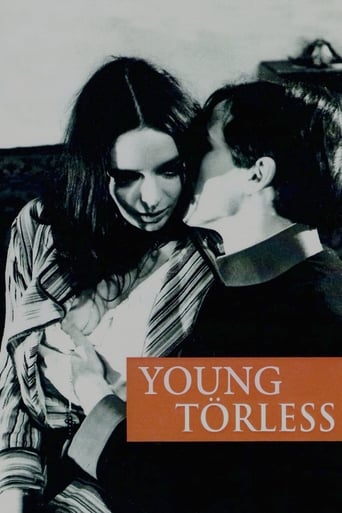Horst in Translation ([email protected])
"Der junge Törless" is a German, black-and-white film from 1966, so this one has its 50th anniversary this year. The writer (i.e. the one who adapted the base material) and director here is Volker Schlöndorff, still in his 20s at this point and it was the big breakthrough for him as this movie here won Best Picture at the German Film Awards. Schlöndorff managed to build a prolific and successful (Oscar winner "Tin Drum") career in the film industry on his success here. For lead actor Mathieu Carrière, it was also the big breakthrough, but while he also has been in films for the last 50 years he didn't make it big really, so that this film here is still his most known role I guess.The film is about life at a boys-only school. We see how one student steals something from another, but instead of reporting him the boys decide to make him their slave, threaten to report him if he doesn't do exactly what the tell him to and there is certainly considerable sexual tone in here too. Carrière, however, plays a student who is more like a quiet observer. he does not really take part in the bullying like the others do, but he also will not help the boy that so desperately needs somebody to stand up for him. He knew very well that this would make him the next target. Then again, his passiveness does so too to some extent, even if it is all not in the open.I had a couple problem with the action in this film. For example, near the end at the gym, it was hard for me to believe that everybody else would suddenly join in and they would act like a mob shouting to kill Basini and if we are honest, not a whole lot was missing. Or that the teachers of the school really turn Basini into the scapegoat for everything that happened. Yes he did steal some money, not much though, but that goes beyond all logical behavior. Then again, maybe Musil, the author of the novel is more to blame for this, unless it makes more sense in the book and Schlöndorff's adaptation was just flawed. The ending of the film makes clear that the title character is also the main character as the film basically ends when he decides to leave school. Who knows what equally gruesome events will happen there in the future. Maybe we are lucky not to find out. All in all, I personally felt the movie was just intended to be as controversial and shocking as possible without telling us a genuinely realistic and interesting story. That's why I believe it is not among the best Germany has to offer in terms of 1960s' movies. I do not recommend the watch and the Academy got it right in not nominating this one.




